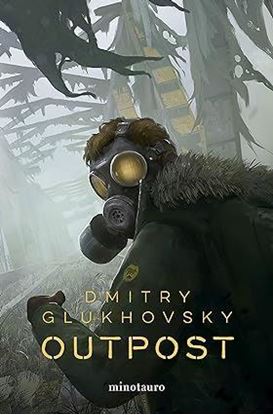

OUTPOST N 01
Estamos en la Rusia que existirá en un futuro cercano. El joven Yegor a duras penas recuerda el mundo anterior a la catástrofe. Ha vivido desde su infancia en un puesto militar de la frontera oriental de su país, desde el que se vigila un puente que cruza el envenenado río Volga. Nadie ha cruzado el puente durante varias décadas... pero eso está a punto de cambiar...
1,400
PROYECTO KARON
Alaxi Dalem está acostumbrado a una vida demasiado tranquila, como agricultor y padre de familia, en un pueblo perdido del desierto de Mojave.
Cuando recibe la visita de dos militares su pasado le explota en la cara: Lena Gradavi, alto mando de defensa, ha sido secuestrada en el Karón, un proyecto que crearon a medias en la universidad.
Dicha máquina crea mundos virtuales, a partir de los recuerdos, y tuvo que ser prohibida y retirada. Alaxi es el único capaz de conectarse.
¿Por qué ha vuelto allí Lena? ¿Quiénes la retienen? Su marido, el general Ritcard, teme por Quimera, el sistema de datos que gobierna el país.
Alaxi acepta conectarse a la mente de Lena, pero sus males acaban de empezar: ella es también su ex y él la dejó de la peor manera, lo que convierte la misión en un auténtico infierno.
850
MONA LISA ACELERADA. SPAWN 3/3
Mona es una joven con un pasado turbio y un futuro incierto cuya vida da un vuelco cuando su proxeneta la vende a un cirujano plástico de Nueva York y, de la noche a la mañana, se convierte en otra persona.
Angie Mitchell es una estrella famosa de Senso/Red de Hollywood con un talento muy particular, y ha empezado a recordar cosas a pesar de que los jefes de su estudio se esfuerzan para que no se dé cuenta. No tardará en descubrir quién es en realidad… y por qué no necesita una consola para enchufarse en el ciberespacio.
Todo se pone en marcha en el interior de la matriz, y los seres humanos empiezan a usarse como piezas en un tablero. Y detrás de todas las intrigas se encuentra la sombría Yakuza, la poderosa mafia japonesa cuyos líderes manipulan implacablemente a las personas y los acontecimientos para conseguir sus objetivos.
1,100
LA CHICA DEL ZODIACO. 3 PARTE (OF2)
El chico géminis es aventurero y competitivo.
El chico cáncer es sentimental y familiar.
El chico leo es extrovertido y cabezota.
El chico virgo es organizado y meticuloso.
ANNA SE ACERCA AL FINAL
Su experimento de salir cada mes con un chico de un signo distinto se acerca a su fin. Después de una mala jugada, deberá recomponerse y seguir adelante para demostrar que el amor no depende del Zodiaco.
ANNA SE ESTÁ ENAMORANDO
Por más que intente engañarse a sí misma, Anna sabe que hay un chico que ha llegado para poner su vida patas arriba. Desea atreverse y dar el paso, pero dejarse llevar por sus sentimientos no es fácil cuando ya lo perdió todo una vez.
ANNA TIENE QUE DECIDIRSE
Ha llegado el momento de tomar una decisión.
¿Se quedará con uno de los chicos del Zodiaco, con otro diferente o seguirá su camino ella sola?
500
GENTE QUE CONOCEMOS EN VACACIONES
Alex y Poppy. No tienen nada en común. Ella viste estampados; él lleva pantalones de pinza. Ella tiene espíritu aventurero; él prefiere quedarse en casa leyendo. Y, a pesar de todo, son mejores amigos. Durante la mayor parte del año viven separados -ella en Nueva York, él en su pequeño pueblo- pero cada verano, desde hace ya una década, se toman una semana de vacaciones juntos. Hasta hace dos años, cuando lo arruinaron todo. No han vuelto a hablar desde entonces.
Poppy tiene todo lo que siempre había soñado, pero está atrapada en la rutina. Cuando alguien le pregunta cuándo fue la última vez que fue feliz de verdad, sabe sin ninguna duda que fue en ese último y fatídico viaje con Alex. Y entonces decide convencer a su mejor amigo para viajar juntos una vez más. Ahora tiene una semana para arreglarlo todo. Si pudiese aceptar la verdad que siempre se ha interpuesto silenciosamente en medio de su supuesta perfecta amistad
¿Qué puede salir mal?
1,250
TEXTOS FUNDAMENTALES
Orikuchi Shinobu fue un lingüista, etnólogo, folclorista, novelista y poeta japonés. Referente de la crítica literaria nacional y de los estudios del folclore en las primeras décadas del siglo xx, este personaje no estuvo exento de polémica por su asociación con el militarismo japonés, su adicción a la cocaína y su homosexualidad declarada. El presente volumen recoge la primera recopilación del trabajo de estudio y traducción sobre la figura de Orikuchi Shinobu con una serie de ensayos y traducciones publicados por primera vez en español, algunos de ellos sin referente en otras lenguas europeas. Esta obra pretende no solo cubrir un hueco de conocimiento necesario en la niponología hispana, sino también reevaluar la obra, la figura y el legado de este autor.
1,500














